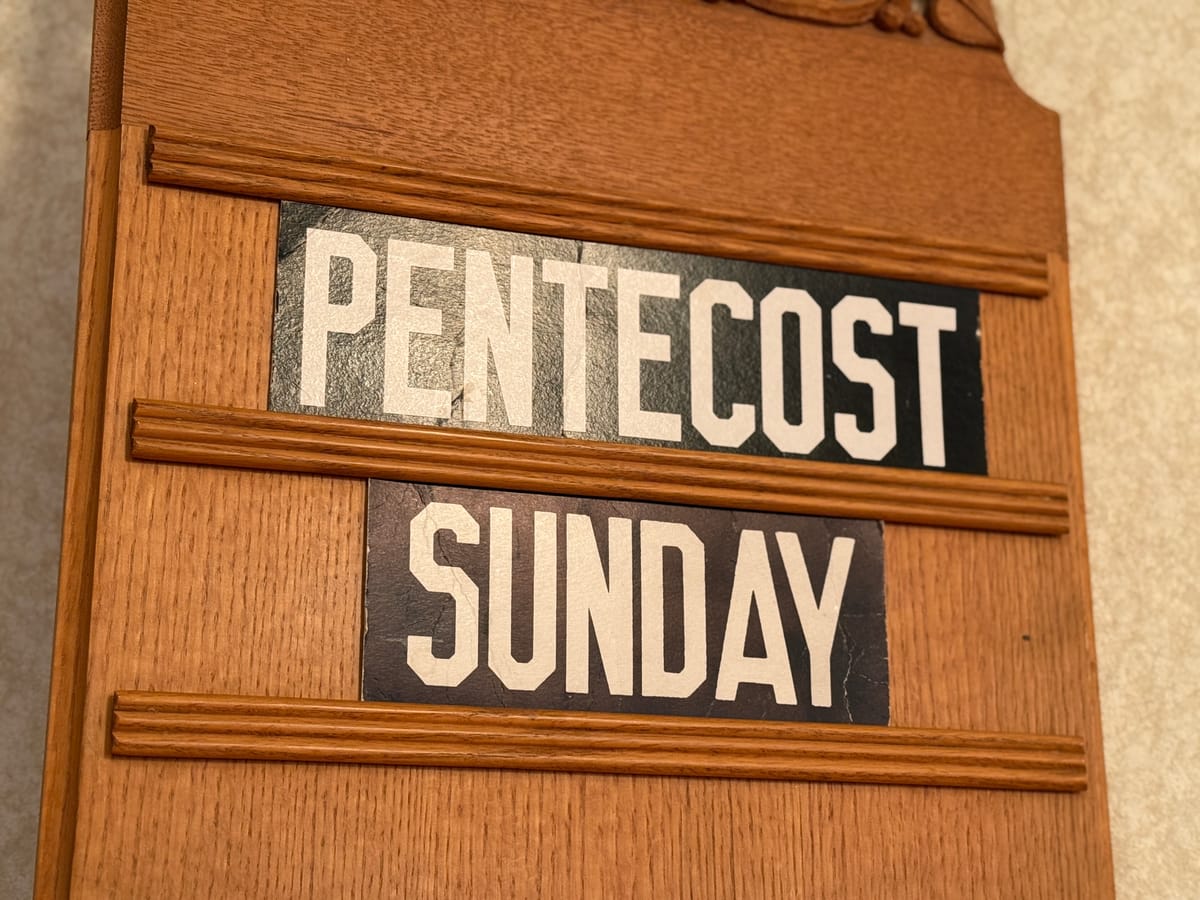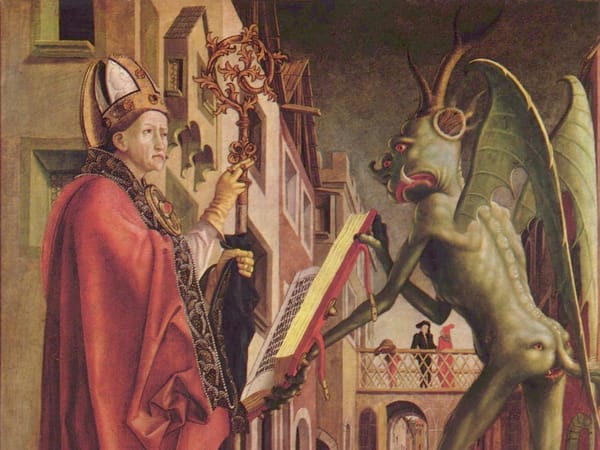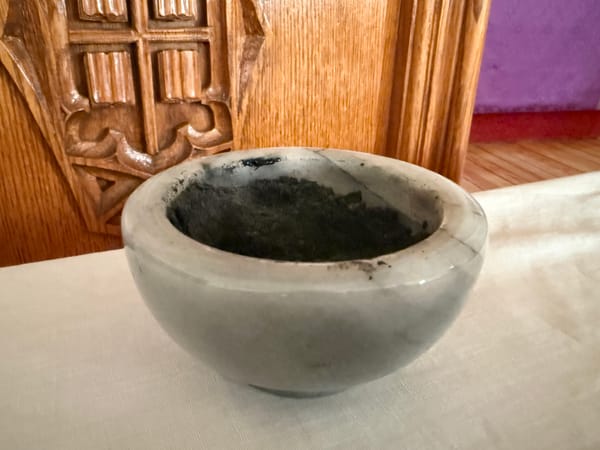God’s Presence Changes Everything Still Today
God’s presence is available and with us today, comforting us, teaching us, reminding us, shaping us, to make this all more like the Kingdom of God.

June 8, 2025 - The Day of Pentecost
My friends, I speak to you today in the name of one God, Father, Son, and Holy Spirit. Amen. Please be seated.
Happy Pentecost, everybody. It’s great looking out at all of this red today; not everyone got the memo, including my family, but that’s more than okay. You’re still welcome here this morning in other colors; this is not some kind of sporting event. Someone asked me this week why it is that the church wears red on this Sunday every year. Well, it’s supposed to symbolize fire, as in those divided tongues of fire that appeared on the disciples in Acts, and also symbolize zeal, passion, and commitment... so maybe it is kind of like a sporting event. Either way, if you’re going to get into this liturgical color tradition, matching our vestments, I expect to see you all in white next Sunday and then in green for the next 19 Sundays after that.
Pentecost, as some of you may know, is the Greek word for “fiftieth.” This is the fiftieth day of the season of Easter, seven full weeks after Easter Sunday. Our celebration echoes the Jewish harvest celebration called the Feast of Weeks; you may have noticed that our first reading today talks about the day of Pentecost as already being a reason to gather. (It’s fifty days after the Jewish Passover too.) The disciples are already all together in one place when this miraculous, supernatural, decidedly unscientific event happens, when a sound comes from heaven like the rush of a violent wind, when tongues of fire dance on each of them, when they find that they can speak and be heard in different languages.
Christian holidays like Pentecost and Easter echoing Jewish traditions like the Feast of Weeks and Passover makes sense when you remember that the people we read about in our gospels were first-century Jews, when our Old Testament is just their “testament,” their holy scriptures. And in the context of their culture, their faith, this moment had far more significance than if tongues of fire started appearing on people down on Phoenix Street. This moment marked the beginning of something long awaited, something new.
For generations of Jews, mysterious windstorms and fire were associated with two things: God’s presence and the formation of a new temple. You likely remember the story of the burning bush, where God speaks to Moses, telling him he’s standing on holy ground. Later in Exodus there are stories of fire and wind on Mount Sinai, signaling God’s presence there. There are stories of pillars of cloud and fire that lead the Israelites out of captivity by day and by night. When they build their first temple, fire shows up again, signifying God’s presence. The prophet Elijah even called down fire from heaven and left this life in a fiery chariot. So here, when fire appears with the sound of a rushing wind, on a Jewish festival day no less, these first century Jews confidently know God is present.
But we know God was already present. For the past six months in our liturgy, we here at Epiphany and throughout the church have been celebrating the particular presence of God found in Jesus Christ. We started our liturgical year with Advent, where we anticipate his arrival for the whole month of December, and then we have Christmas, the incarnation, where God is fully present in a little eight-pound six-ounce newborn infant Jesus, no crying he makes. We celebrate at Christmas that God loves us enough to be with us, and fully so. Then that presence is revealed at Epiphany in January, with the wise men, Jesus’s baptism, and the wedding in Cana. We celebrate all of the epiphanies until Lent, when we begin to prepare for and mourn what humanity did to the embodied presence of God at the crucifixion. And then for seven full weeks after Easter, we celebrate the resurrection, the presence of God made manifest in a risen Savior. God has been present.
In our Gospel text, we have Philip and this presence of God in Jesus talking through this all together. The lectionary rewinds our tape a bit and takes us back to the Last Supper, where John tells the story of their interaction. Philip puts it bluntly to Jesus, “Show us God, Jesus, and then we’ll be satisfied.” But like Abbey and I might say to one of our daughters when they clearly have not been listening to any of our instructions, Jesus responds with a loving but firm “Are you kidding right now? I’ve been showing you God this whole time.” Whoever has seen Jesus has seen God, he says, because he in the Father and the Father is in him. Anyone who believes in Jesus will do the things that he has been doing, and more, he promises. If you love him, you will keep his commandments. Love God, love neighbor, love each other, love your enemy. Love. God is Love; this is God.
But back to the Spirit and Pentecost. In the Gospel text, Jesus tells the disciples that they have seen God in him, but that Jesus has to leave, and then God will send the Advocate, the Holy Spirit, to be with them forever, to teach them everything, to remind them of all that he has said and done. In our first reading, this is the long-awaited fulfillment of that promise, a fulfillment that changes everything. For the Jews, God’s presence was in the fire, in the wind. With the Holy Spirit descending in fire and wind on the day of Pentecost, the words of their prophets were finally being fulfilled: God poured out his Spirit on all flesh, not just on a singular prophet or two, not just in a temple, but on everyone. A brand new day was dawning when God would not be confined to a temple nor even to the singular holy person in Jesus, but would now be available to all. As Paul wrote, “all who are led by the Spirit of God are children of God.” All. No exceptions.
So... where are we now then? Where are we this morning? Are you with me? I admit that that was more Bible and context to start the sermon than usual, I usually don’t do that. I usually tell a personal, relatable story to try to hook you and then end on an encouraging note of the good news of the gospel, because these seem to be anxiety-producing times.
Personally, I could not watch much of the news this week without my anxiety level rising. Today, we have protests and ICE and now the National Guard deployed in California... we have two rich, powerful men fighting like competing school-aged bullies in our public squares.... we had the biggest drone attack of the war thus far yesterday in Ukraine, killing four and injuring 60 in Ukraine’s second largest city... we have the Red Cross crying out for the war crimes in Gaza to stop, or to at least to be recognized by those with power. You’re probably thinking that an encouraging note in this sermon might be particularly nice this week, in light of all that’s going on in the world around us. Enough of the Bible. Well, we do have the last verse of this gospel passage, and though I’m not done with this sermon just yet, that is where I myself am trying to land today.
Remember that Jesus is meeting with his disciples at the Last Supper, knowing what is ahead for him, and he promises them this Holy Spirit we have with us today. He can’t be with them as Jesus forever, but this Advocate can. And then Jesus connects the coming of this spirit, what we now know as the long-awaited fulfillment of God’s promises to Israel that happened at this Pentecost two thousand years ago, he connects it with this simple reassurance: “Peace I leave with you, my peace I give to you. I do not give to you as the world gives. Do not let your hearts be troubled, and do not let them be afraid.”
So, what does Pentecost mean for us today? What does it mean when we sing that we feel the spirit moving in our heart, or when we sing come Holy Spirit come? In today’s Gospel text we have the answer, even though we might not always remember to hear it. If we love God, if we love Jesus, we will try to keep his commandments to love, yes. And then, when we forget how and when and who and where to love, when we are challenged by the difficulties of the world around us, whether they be sickness or loss or widescale injustice, we can be comforted by the Holy Spirit, the Advocate, who is with us forever, teaching us everything we need to know, reminding us of what is good and real and right.
Thanks to Pentecost, the pouring out of God’s Spirit to all, we know that God’s presence is available and with us still today, comforting us, teaching us, reminding us, shaping us, to make this world more like the upside-down kingdom of God. That presence changes everything. So, do not let your hearts be troubled, and do not let them be afraid.
Amen.




